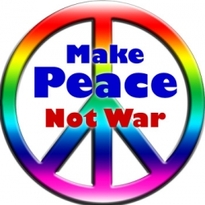World peace is always a huge concern, as conflicts in other countries have a way of creeping over and involving the United States. Not that I object to helping a friend in need, but the kind of help required in these situations often mean catastrophic loss of human life on all sides, and never the people that started the conflict in the first place. Peace within the United States would be a nice change, too. Not the peace that comes with hanging one's head and surrendering to injustice, but the kind of peace that abounds when people began to look at each other as human beings; not by race, or class or any other man-conceived division. When people finally realize that treating someone with the respect that all human beings deserve will get them further towards their goals than treating them with contempt or derision based on how they look or their perceived station in life, I dare say that this country will find itself back to being the economic powerhouse it once was, and with a happier populace to boot.
The same can be said for achieving peace even on local levels. The inability to treat each other with respect, especially those we consider to be different from ourselves, drives most of our conflicts, especially in the midst of profound disagreement over a course of action. Usually, the disagreements that spark conflicts at home, on the job, in our churches, in our cities, states, nations and all over the world is change. People fear change. Especially people or groups that are benefiting from "the way things are". Do not do anything different from what we are already doing, one group will rise up and say. It has always worked in the past, so why change it now? Another group will ask, Why not make changes? The way things are is not working for everyone, and maybe a few changes might make (fill in the situation) better. The second group will create a plan for change that they hope will benefit the largest number of people, and will be repeatedly denied by the first group. Now we have conflict between two groups, and seemingly no way out of it.
You would think this would be the perfect time for the Peacemaker to enter the picture. The goal of the Peacemaker is reconciliation. The peacemaker brings both sides of an issue together in order to seek the best possible solution for all involved parties. Finding common ground and working from that starting place is the most important tool in the Peacemakers bag of tricks. The Peacemaker is who all parties should embrace.
Unfortunately, what the majority of the world gets during these times are the Instigators. The Instigator protects the status quo at all costs, generally because they expect to benefit from it, either directly or indirectly. Rumor-mongering, outright lies and de-stabilization of opposing groups are tools the Instigator uses to further his agenda. This was so important in Germany in the 1930's, that Adolph Hitler created a Minister of Propaganda position in his cabinet for Joseph Goebbels. Although what happened in Germany was done to defend the indefensible, and as such, no governing body would create that type of position today, you could argue that they don't have to. There are far too many media pundits only too willing to continually spread lies and gossip so that any deviation from "how it's always been done" is regarded with fear and suspicion, enabling those in power to remain there. This is true on every level where there is a governing body that wants to retain power and influence, even after a new governing body has been elected. And we all know someone in our personal periphery that fulfills the role of the Instigator: a person who thrives on chaos, is the first to spread rumors, if not start them, and is willing to lie about anything or anyone without a thought to anything other than what they stand to gain by creating someone's downfall. The sad reality of this, is that in the world of politics, the Instigator usually wins.
How much better would our lives be if we could all embrace the role of the Peacemaker? What kind of progress could be made if the Instigator realized that allowing change to happen will not diminish them, as much as their own reactions to proposed changes might? When we begin to regard each other as equals ("For all have sinned and fall short of the glory of God" - Romans 3:23 NIV), and treat each other accordingly (there is such a thing as respectful disagreement), we all start to inherit the role of Peacemaker. With a world in constant conflict, at all levels, more Peacemakers are desperately needed. Now, not later.


 RSS Feed
RSS Feed
